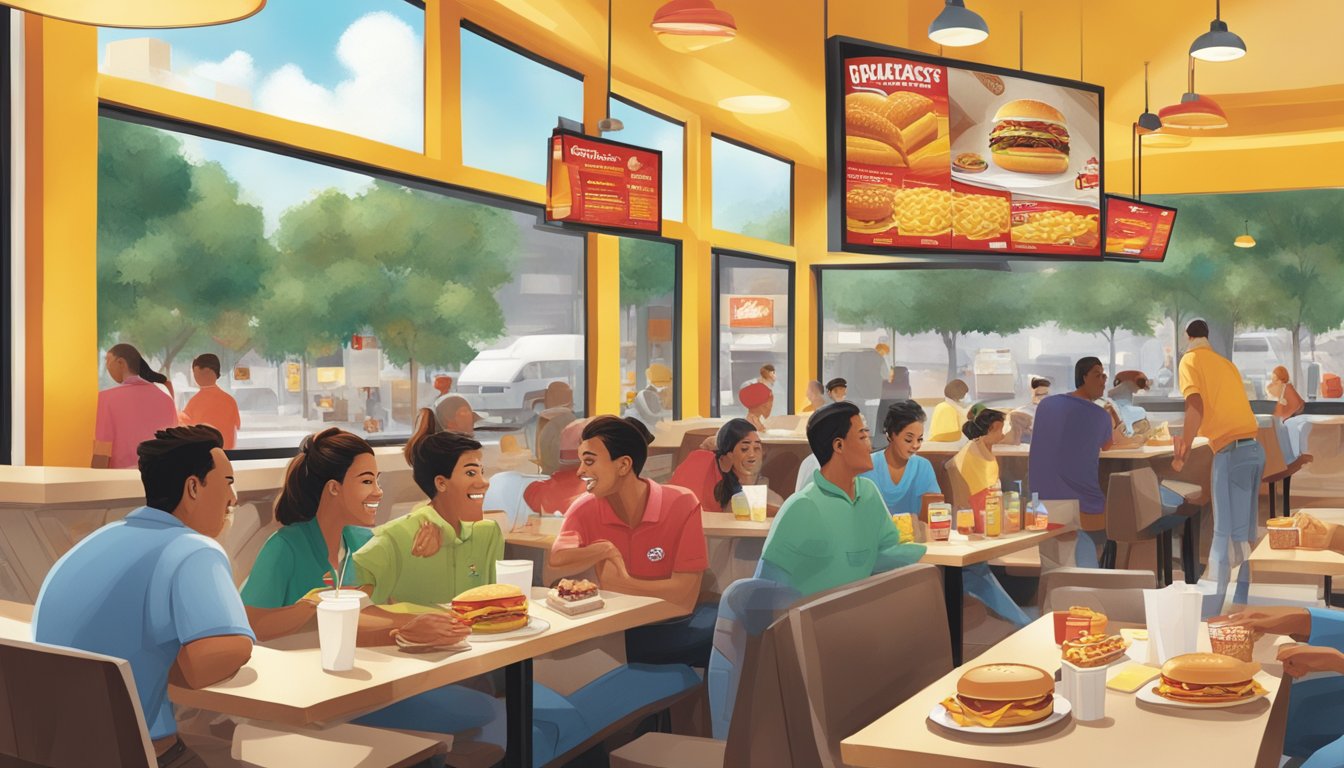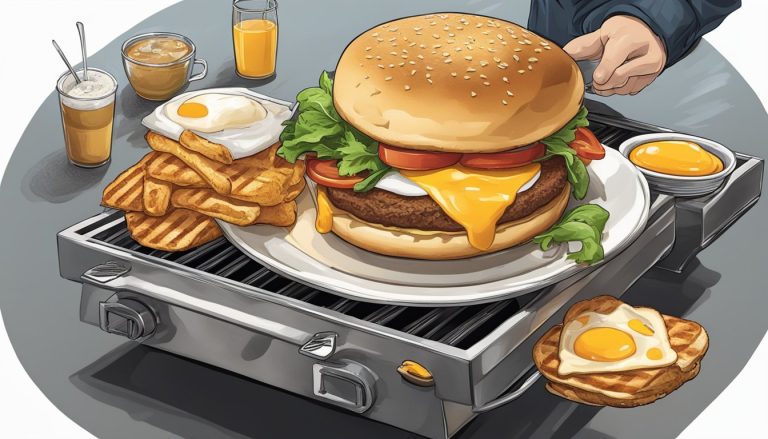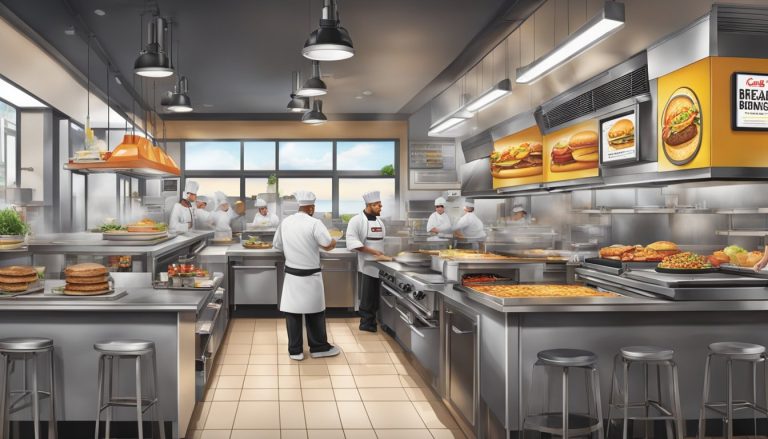In the fast-paced world of fast food breakfast, Carl’s Jr. has carved out a unique position for itself. The chain’s bold approach to marketing and menu offerings sets it apart from competitors in the crowded breakfast market. Carl’s Jr. differentiates itself through premium ingredients and indulgent options that cater to a younger, predominantly male demographic.
The breakfast wars among fast food chains have intensified in recent years, with each brand vying for customer attention and loyalty. Carl’s Jr. has responded by leveraging its strength in burger offerings to create breakfast sandwiches that stand out. The chain’s use of Angus beef and large portion sizes appeals to those seeking a hearty morning meal.
Carl’s Jr.’s marketing strategy plays a crucial role in its breakfast success. The brand is known for its attention-grabbing advertisements and celebrity partnerships. This bold approach helps Carl’s Jr. maintain visibility in a market where established players like McDonald’s and newcomers like Shake Shack compete for breakfast dollars.
Carl’s Jr.’s Distinctive Breakfast Offerings
Carl’s Jr. has carved out a unique niche in the competitive breakfast market with its bold flavors and hearty portions. The chain offers a diverse array of morning options that cater to various tastes and appetites.
Exploring the Breakfast Menu
Carl’s Jr.’s breakfast menu features a wide range of items to satisfy different cravings. From savory sandwiches to sweet treats, the options are plentiful. The menu includes:
- Breakfast burgers
- Biscuit sandwiches
- Breakfast burritos
- French toast dips
- Hash rounds
Customers can choose from combo meals or à la carte items. Most locations serve breakfast until 10:30 AM, though hours may vary by day and location.
Signature Breakfast Items
The Breakfast Burger stands out as Carl’s Jr.’s most iconic morning offering. This unique creation includes:
- Charbroiled all-beef patty
- Crispy bacon
- Fried egg
- American cheese
- Hash rounds
- Ketchup on a seeded bun
Other popular items include the Monster Biscuit and Grilled Cheese Breakfast Sandwich. The Monster Biscuit packs eggs, bacon, sausage, and cheese between two biscuit halves.
Innovations in Breakfast Options
Carl’s Jr. continues to innovate its breakfast lineup. Recent additions include:
- French Toast Dips: A portable twist on a breakfast classic
- Avocado Burrito: Catering to health-conscious customers
- Grilled Cheese Breakfast Sandwich: A comforting fusion of breakfast and lunch
These new items showcase Carl’s Jr.’s commitment to evolving its menu. The chain balances traditional favorites with fresh concepts to keep customers engaged and satisfied.
Quality Ingredients and Culinary Craft

Carl’s Jr. sets itself apart in the breakfast market through its commitment to quality ingredients and culinary expertise. The chain prioritizes fresh components and transparency in its nutritional offerings.
Fresh and Premium Ingredients
Carl’s Jr. sources premium ingredients for its breakfast menu. The chain uses 100% Angus beef patties in its breakfast burgers, ensuring a rich flavor profile. Fresh eggs are cracked and cooked to order, maintaining quality and taste.
Bacon is thick-cut and cooked until crispy, adding a satisfying texture to breakfast sandwiches. Hash rounds are made from real potatoes, providing a crispy exterior and fluffy interior.
Carl’s Jr. selects American cheese for its superior meltability, creating a creamy texture in breakfast items. Vegetables like tomatoes and lettuce are fresh-cut daily, enhancing the overall taste and nutritional value of breakfast offerings.
Nutritional Transparency
Carl’s Jr. provides detailed nutritional information for all menu items. Calorie counts are clearly displayed on menus, helping customers make informed choices. The chain offers a breakdown of macronutrients, including protein, carbohydrates, and fat content for each item.
Sodium levels and allergen information are readily available, catering to health-conscious consumers and those with dietary restrictions. Carl’s Jr. highlights items with higher fiber content, such as the Breakfast Burger with 4 grams of fiber.
The chain acknowledges indulgent options like the high-calorie Breakfast Burger while also offering lighter alternatives. This transparency allows customers to balance their nutritional needs with taste preferences.
The Art of Charbroiling
Carl’s Jr. has built its reputation on the distinctive flavor of charbroiled burgers. This cooking method imparts a smoky taste and appealing grill marks that set their offerings apart.
Charbroiled Burger Excellence
Carl’s Jr. uses specially designed broilers to cook their beef patties. These machines sear the meat at high temperatures, creating a caramelized exterior while sealing in juices. The process results in a flavorful crust and tender interior.
Charbroiling also allows excess fat to drip away, potentially reducing calorie content. Carl’s Jr. takes pride in using 100% Angus beef for many of its burgers, enhancing the quality of the final product.
The chain’s signature char lines are more than just visual appeal – they contribute to the overall taste experience. These marks indicate where the meat has been exposed to the most intense heat, developing complex flavors through the Maillard reaction.
Expanding Beyond Burgers
Carl’s Jr. applies its charbroiling expertise to other menu items. Chicken sandwiches benefit from this cooking method, gaining a smoky flavor that complements various toppings and sauces.
The chain has experimented with charbroiled options like turkey burgers and veggie patties. This versatility allows Carl’s Jr. to cater to diverse dietary preferences while maintaining its signature cooking style.
Charbroiled items often feature prominently in limited-time offers, showcasing the technique’s adaptability. These specials help keep the menu fresh and exciting for regular customers.
By extending charbroiling to non-beef items, Carl’s Jr. reinforces its brand identity across its entire menu. This consistency helps differentiate the chain in the competitive fast-food landscape.
Convenience and Service

Carl’s Jr. prioritizes efficiency and customer satisfaction to differentiate itself in the competitive fast food landscape. The chain focuses on streamlining its drive-thru operations and fostering a customer-centric approach to service.
Efficient Drive-Thru Experience
Carl’s Jr. has invested heavily in optimizing its drive-thru systems. The company utilizes advanced digital menu boards and order confirmation screens to enhance accuracy and speed. These technologies allow customers to review their orders in real-time, reducing errors and improving satisfaction.
Carl’s Jr. also employs a dual-lane drive-thru design at many locations. This setup enables the restaurant to process more orders simultaneously, cutting down wait times during peak hours. The chain’s drive-thru employees are trained to handle complex customizations quickly, ensuring that even specialized orders move through the line efficiently.
Customer Service Commitment
Carl’s Jr. places a strong emphasis on customer service training. Employees undergo rigorous programs focused on politeness, attentiveness, and problem-solving skills. The company encourages its staff to personalize interactions, creating a more welcoming atmosphere for patrons.
The chain has implemented a feedback system that allows customers to rate their experiences. This data is used to identify areas for improvement and recognize exceptional service. Carl’s Jr. also offers a variety of combo meals designed for convenience, allowing customers to quickly select complete meal options.
To further enhance service, Carl’s Jr. has introduced mobile ordering capabilities. This feature enables customers to place orders in advance, reducing wait times and streamlining the pickup process. The company continues to explore innovative ways to improve convenience and maintain a competitive edge in customer service.
Adapting to Consumer Preferences
Carl’s Jr. actively adjusts its breakfast offerings to align with evolving consumer tastes and demands. The chain focuses on introducing healthier alternatives and providing customization options to cater to individual preferences.
Healthier Breakfast Alternatives
Carl’s Jr. has expanded its menu to include more nutritious breakfast choices. The chain now offers egg white options for many of its breakfast sandwiches, reducing calorie and fat content. Whole grain buns and wraps have been introduced as alternatives to traditional white bread.
Fresh fruit cups and yogurt parfaits provide lighter options for health-conscious customers. Carl’s Jr. has also incorporated plant-based proteins into its breakfast menu, catering to vegetarian and flexitarian diets.
Customization and Personalization
Carl’s Jr. recognizes the importance of allowing customers to tailor their breakfast orders. The chain offers a “build-your-own” breakfast sandwich option, where customers can choose their preferred bread, protein, cheese, and toppings.
Customization extends to portion sizes as well. Customers can opt for smaller, snack-sized breakfast items or larger, more filling options. Carl’s Jr. also provides the ability to modify existing menu items, such as removing cheese or adding extra vegetables.
To streamline the customization process, Carl’s Jr. has implemented digital ordering kiosks in many locations. These allow customers to easily view and select their desired modifications.
Operational Hours and Accessibility

Carl’s Jr. emphasizes flexibility in its breakfast service, aiming to cater to early risers and late sleepers alike. The chain’s approach to breakfast hours reflects its commitment to meeting diverse customer needs.
All-Day Breakfast Strategy
Carl’s Jr. typically starts serving breakfast at 6:00 AM on weekdays. This early start allows the restaurant to capture the morning commuter crowd. Most locations stop breakfast service at 10:30 AM, transitioning to their regular menu.
Some Carl’s Jr. restaurants operate 24/7, offering increased accessibility for customers. These locations may have extended breakfast hours, catering to night shift workers or early morning travelers.
Weekend breakfast hours often differ, with many locations starting service later. This adjustment aligns with changing customer habits on weekends.
Carl’s Jr. has experimented with all-day breakfast options at select locations. This strategy aims to compete with other fast-food chains that have successfully implemented similar programs.
The chain’s approach to breakfast hours varies by franchise. Individual owners have the flexibility to adjust serving times based on local demand and operating conditions.
Promotions and Marketing Strategies
Carl’s Jr. employs targeted campaigns and distinctive branding to stand out in the competitive breakfast market. Their strategies focus on reaching key demographics and cultivating a memorable brand identity.
Targeted Marketing Campaigns
Carl’s Jr. directs its breakfast promotions toward young adult males aged 18-34. The company leverages social media platforms like Instagram and TikTok to showcase indulgent breakfast items. Eye-catching visuals of oversized breakfast sandwiches and biscuits appeal to this demographic’s desire for hearty morning meals.
Special offers play a crucial role in Carl’s Jr.’s breakfast strategy. Limited-time promotions, such as “2 for $4” breakfast sandwich deals, drive traffic during morning hours. The chain also partners with delivery apps to offer exclusive breakfast combos, catering to the convenience-seeking habits of younger consumers.
Developing a Strong Brand Identity
Carl’s Jr. has cultivated a bold and unapologetic brand persona. Their breakfast marketing embraces an indulgent, “bigger is better” philosophy that sets them apart from health-focused competitors. This approach aligns with their overall brand identity of satisfying big appetites.
The company’s breakfast ads often feature close-up shots of cheese pulls and dripping egg yolks, emphasizing the sensory appeal of their menu items. Carl’s Jr. also leverages celebrity partnerships to boost brand recognition. Collaborations with athletes and actors reinforce the brand’s association with an active, ambitious lifestyle.
To maintain consistency, Carl’s Jr. applies its signature star logo prominently across all breakfast packaging and promotional materials. This visual branding helps create a cohesive identity that customers can easily recognize and associate with satisfying morning meals.
Navigating the Competitive Landscape
Carl’s Jr. faces fierce competition in the fast food industry, particularly in the breakfast and burger segments. The chain employs strategic positioning and customer-focused initiatives to maintain its market share.
Competing with Major Fast Food Chains
Carl’s Jr. differentiates itself through its premium burger offerings and creative menu items. The chain’s signature Thickburgers and hand-breaded chicken sandwiches appeal to customers seeking higher-quality fast food options.
Carl’s Jr. also focuses on generous portion sizes and bold flavors to stand out from competitors. The company’s breakfast menu features items like the Monster Biscuit and Breakfast Burger, aiming to capture morning customers.
To compete with larger chains, Carl’s Jr. emphasizes regional menu variations and limited-time offerings. This strategy allows the company to test new products and cater to local tastes.
Cultivating Customer Loyalty
Carl’s Jr. implements various tactics to build and maintain customer loyalty. The chain offers a rewards program that provides points for purchases, redeemable for free menu items.
Digital engagement plays a key role in Carl’s Jr.’s loyalty strategy. The company’s mobile app allows for easy ordering, exclusive deals, and personalized offers based on customer preferences.
Carl’s Jr. also focuses on consistency in food quality and service across locations. Regular training programs ensure staff can deliver a uniform customer experience.
The chain actively seeks customer feedback through surveys and social media. This input helps Carl’s Jr. refine its menu and operations to better meet customer expectations.




